在英语中如何拼写中国人的姓名
中文名字用英文怎么写
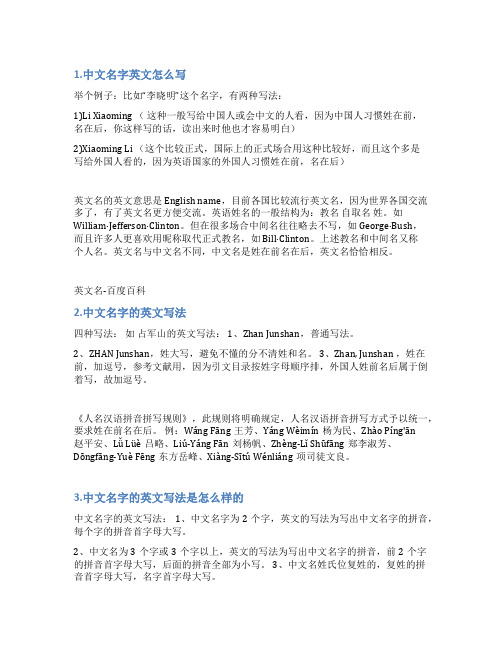
1.中文名字英文怎么写举个例子:比如“李晓明”这个名字,有两种写法:1)Li Xiaoming (这种一般写给中国人或会中文的人看,因为中国人习惯姓在前,名在后,你这样写的话,读出来时他也才容易明白)2)Xiaoming Li (这个比较正式,国际上的正式场合用这种比较好,而且这个多是写给外国人看的,因为英语国家的外国人习惯姓在前,名在后)英文名的英文意思是English name,目前各国比较流行英文名,因为世界各国交流多了,有了英文名更方便交流。
英语姓名的一般结构为:教名自取名姓。
如William·Jefferson·Clinton。
但在很多场合中间名往往略去不写,如 George·Bush,而且许多人更喜欢用昵称取代正式教名,如 Bill·Clinton。
上述教名和中间名又称个人名。
英文名与中文名不同,中文名是姓在前名在后,英文名恰恰相反。
英文名-百度百科2.中文名字的英文写法四种写法:如占军山的英文写法: 1、Zhan Junshan,普通写法。
2、ZHAN Junshan,姓大写,避免不懂的分不清姓和名。
3、Zhan, Junshan ,姓在前,加逗号,参考文献用,因为引文目录按姓字母顺序排,外国人姓前名后属于倒着写,故加逗号。
《人名汉语拼音拼写规则》,此规则将明确规定,人名汉语拼音拼写方式予以统一,要求姓在前名在后。
例:Wáng Fāng王芳、Yáng Wèimín杨为民、Zhào Píng'ān赵平安、Lǚ Lüè吕略、Liú-Yáng Fān刘杨帆、Zhèng-Lǐ Shūfāng郑李淑芳、Dōngfāng-Yuè Fēng东方岳峰、Xiàng-Sītú Wénliáng项司徒文良。
中国人英语名字的书写格式

中国人名字的英文写法,就是汉语拼音:姓在前,名在后,姓和名分开写,姓和名的开头字母均大写。
两字姓名:
比如:张平应该写:Zhang Ping。
1、中国人的名字在英语中用汉语拼音拼写,姓与名要分开写,不能连在一起,姓与名的第一个字母都要大写,姓氏在前面,名字在后面。
例如英语名字的书写格式:我是张三。
译文:I'm Zhang San .
2、在姓氏和名字都是一个字时,在英语中姓和名的拼音首字母分别大写。
例如:李雷。
英文:Li Lei.
3、在姓氏是一个字、名字是两个字时,姓氏写法不变,名字为两个字,这名字的两个字的拼音要连起来写,只大写第一个字的拼音首字母。
例如:韩梅梅。
英文:Han Meimei .
4、在中国姓氏中有复姓,也就是两个字,这样要把姓氏两个字的拼音连起来一起写第一个字母大写。
例如:诸葛亮。
英文:Zhuge Liang .
5、在名字里含有造成发音混淆的拼写字时,一般要用“' ”来区分隔开。
例如:张西安。
Zhang Xi'an .
6、中文姓名与英文姓名在写法上是有区别的:中国人的名字是姓在前,名在后;英文姓名是名在前,姓在后。
中国人名字的英语书写格式
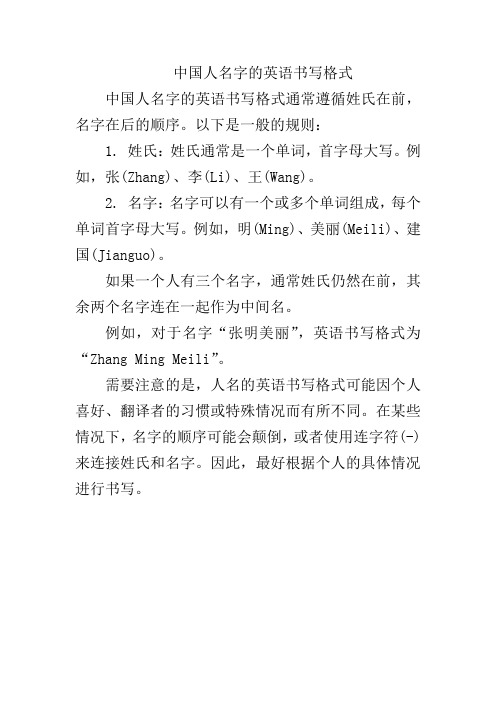
中国人名字的英语书写格式
中国人名字的英语书写格式通常遵循姓氏在前,名字在后的顺序。
以下是一般的规则:
1. 姓氏:姓氏通常是一个单词,首字母大写。
例如,张(Zhang)、李(Li)、王(Wang)。
2. 名字:名字可以有一个或多个单词组成,每个单词首字母大写。
例如,明(Ming)、美丽(Meili)、建国(Jianguo)。
如果一个人有三个名字,通常姓氏仍然在前,其余两个名字连在一起作为中间名。
例如,对于名字“张明美丽”,英语书写格式为“Zhang Ming Meili”。
需要注意的是,人名的英语书写格式可能因个人喜好、翻译者的习惯或特殊情况而有所不同。
在某些情况下,名字的顺序可能会颠倒,或者使用连字符(-)来连接姓氏和名字。
因此,最好根据个人的具体情况进行书写。
在英语中如何拼写中国人的姓名

谢谢!
2)如果是单姓,名是一个字,姓的第 一个字母要大写,名的第一个字母也要 大写,其他字母都小写。 例:Tao Zhe陶喆 3)如果是复姓,要把复姓拼写在一 起,只需大写复姓的第一个字母。名的 拼写方式如上所说。 例:Dongfang Bubai东方不败
4)如果名字里有可能造成歧义 的拼写时,中间要用间隔符号 “ ’ ”隔开。 例:Zhang Xi’an张希安
中国人名在英语句子中
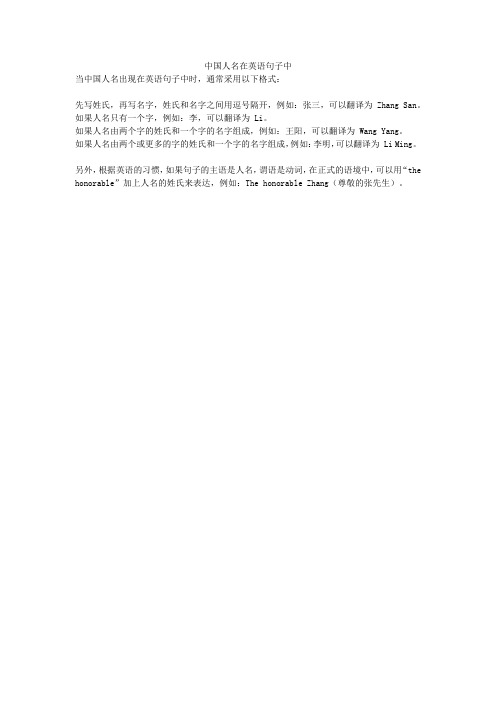
中国人名在英语句子中
当中国人名出现在英语句子中时,通常采用以下格式:
先写姓氏,再写名字,姓氏和名字之间用逗号隔开,例如:张三,可以翻译为 Zhang San。
如果人名只有一个字,例如:李,可以翻译为 Li。
如果人名由两个字的姓氏和一个字的名字组成,例如:王阳,可以翻译为 Wang Yang。
如果人名由两个或更多的字的姓氏和一个字的名字组成,例如:李明,可以翻译为 Li Ming。
另外,根据英语的习惯,如果句子的主语是人名,谓语是动词,在正式的语境中,可以用“the honorable”加上人名的姓氏来表达,例如:The honorable Zhang(尊敬的张先生)。
中国人名英文规则

中国人名英文规则
1. 两个字的姓名
姓氏在前名在后,姓氏的第一个字母大写名字的第一个字母也大写,其余字母小写。
2. 三个字的姓名
姓氏在前名在后,姓氏的第一个字母大写,名字的第一个字的字母也大写,其余字母小写。
注意!
三个字的姓名,名字的第一个字的字母和第二个字的字母要连起来写!
例子
李明 Li Ming
李小明 Li Xiaoming
对比:
西方人姓名,名在前姓在后,姓氏的第一个字母大写,名字的第一个字母大写,其余字母小写。
例子
William Smith
William是名字,在前面;Smith是姓氏,在名字后面。
英语中中国人名字写法 -回复
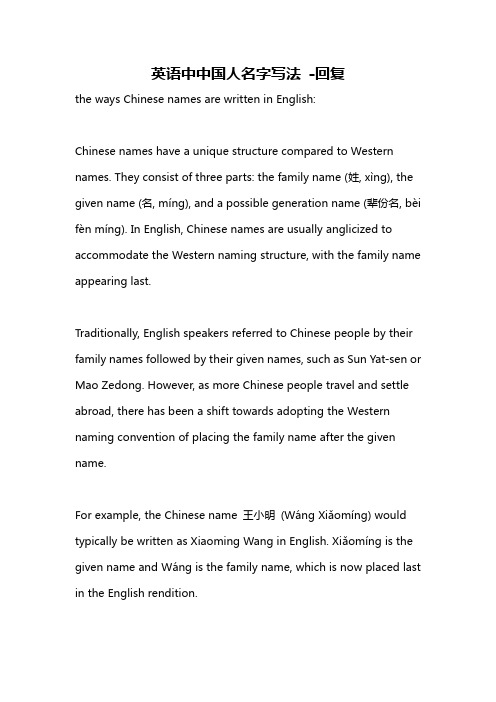
英语中中国人名字写法-回复the ways Chinese names are written in English:Chinese names have a unique structure compared to Western names. They consist of three parts: the family name (姓, xìng), the given name (名, míng), and a possible generation name (辈份名, bèi fèn míng). In English, Chinese names are usually anglicized to accommodate the Western naming structure, with the family name appearing last.Traditionally, English speakers referred to Chinese people by their family names followed by their given names, such as Sun Yat-sen or Mao Zedong. However, as more Chinese people travel and settle abroad, there has been a shift towards adopting the Western naming convention of placing the family name after the given name.For example, the Chinese name 王小明(Wáng Xiǎomíng) would typically be written as Xiaoming Wang in English. Xiǎomíng is the given name and Wáng is the family name, which is now placed last in the English rendition.Another aspect is the use of Romanization systems to represent Chinese names. The most commonly used system is the Pinyin system, which was developed in the 1950s and is the official romanization system in China. Pinyin uses the Latin alphabet to transcribe the pronunciation of Chinese characters. It helps English speakers to pronounce Chinese names correctly.For instance, the Chinese name 钟南山(Zhōng Nánshān) would be written as Nanshan Zhong in English. Zhōng is the family name, and Nánshān is the given name, with Nanshan being a common geographical name in China. Pinyin provides an accurate representation of the sounds in the Chinese language, making it easier for English speakers to read and pronounce Chinese names correctly.It is important to note that some Chinese individuals may choose to keep the traditional family name-first ordering when writing their names in English, while others may opt for the Western given name-first format. This is a personal preference and can vary from person to person.Chinese names also have cultural and historical significance. Forexample, many Chinese names are formed by combining two individual characters to create a unique meaning. These characters can be related to nature, elements, animals, virtues, or historical events. The meaning and symbolism behind a Chinese name are often deeply rooted in the individual's heritage and provide insight into their cultural identity.In conclusion, Chinese names are written in English by placing the family name last, adopting the Western naming convention. The Pinyin system is commonly used to accurately represent the pronunciation of Chinese characters. However, personal preferences may result in variations in name order. Chinese names not only reflect personal identity but also carry cultural and historical significance. They are an integral part of Chinese culture and heritage, connecting individuals to their roots and shaping their sense of self.。
中文人名在英文文献中的格式
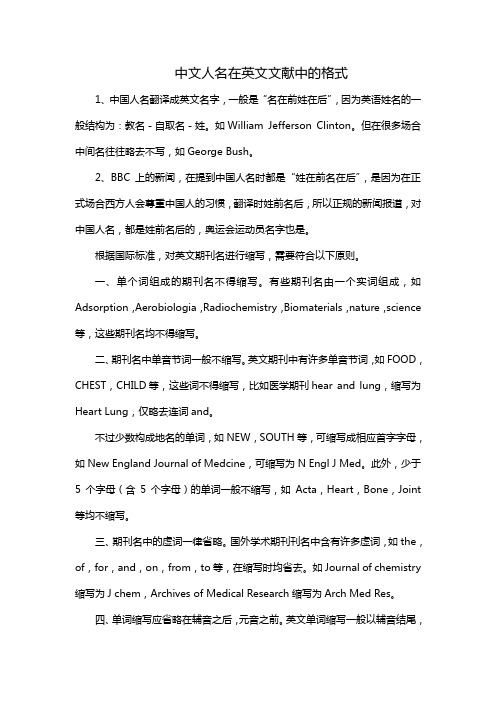
中文人名在英文文献中的格式1、中国人名翻译成英文名字,一般是“名在前姓在后”,因为英语姓名的一般结构为:教名-自取名-姓。
如William Jefferson Clinton。
但在很多场合中间名往往略去不写,如George Bush。
2、BBC上的新闻,在提到中国人名时都是“姓在前名在后”,是因为在正式场合西方人会尊重中国人的习惯,翻译时姓前名后,所以正规的新闻报道,对中国人名,都是姓前名后的,奥运会运动员名字也是。
根据国际标准,对英文期刊名进行缩写,需要符合以下原则。
一、单个词组成的期刊名不得缩写。
有些期刊名由一个实词组成,如Adsorption,Aerobiologia,Radiochemistry,Biomaterials,nature,science 等,这些期刊名均不得缩写。
二、期刊名中单音节词一般不缩写。
英文期刊中有许多单音节词,如FOOD,CHEST,CHILD等,这些词不得缩写,比如医学期刊hear and lung,缩写为Heart Lung,仅略去连词and。
不过少数构成地名的单词,如NEW,SOUTH等,可缩写成相应首字字母,如New England Journal of Medcine,可缩写为N Engl J Med。
此外,少于5个字母(含5个字母)的单词一般不缩写,如Acta,Heart,Bone,Joint 等均不缩写。
三、期刊名中的虚词一律省略。
国外学术期刊刊名中含有许多虚词,如the,of,for,and,on,from,to等,在缩写时均省去。
如Journal of chemistry 缩写为J chem,Archives of Medical Research缩写为Arch Med Res。
四、单词缩写应省略在辅音之后,元音之前。
英文单词缩写一般以辅音结尾,而不以元音结尾。
如American省略为Am,而不省略为Ame或Amer,Medicine或Medical缩写为Med,European缩写为Eur等。
在英语作文中中国人的名字的
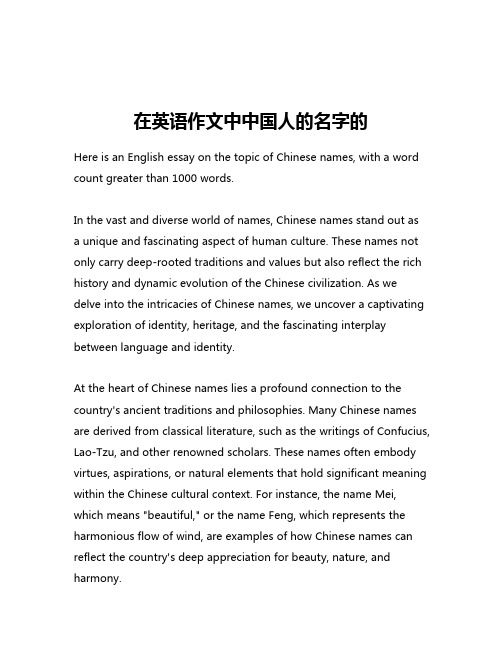
在英语作文中中国人的名字的Here is an English essay on the topic of Chinese names, with a word count greater than 1000 words.In the vast and diverse world of names, Chinese names stand out as a unique and fascinating aspect of human culture. These names not only carry deep-rooted traditions and values but also reflect the rich history and dynamic evolution of the Chinese civilization. As we delve into the intricacies of Chinese names, we uncover a captivating exploration of identity, heritage, and the fascinating interplay between language and identity.At the heart of Chinese names lies a profound connection to the country's ancient traditions and philosophies. Many Chinese names are derived from classical literature, such as the writings of Confucius, Lao-Tzu, and other renowned scholars. These names often embody virtues, aspirations, or natural elements that hold significant meaning within the Chinese cultural context. For instance, the name Mei, which means "beautiful," or the name Feng, which represents the harmonious flow of wind, are examples of how Chinese names can reflect the country's deep appreciation for beauty, nature, and harmony.Moreover, the structure and composition of Chinese names also bear remarkable significance. In the traditional Chinese naming system, the family name precedes the given name, a practice that emphasizes the importance of familial identity and lineage. This order not only reflects the collectivist nature of Chinese culture but also serves as a testament to the enduring influence of Confucian values, which emphasize the individual's role within the larger family and societal structures.The nuances and complexities of Chinese names extend beyond their literal meanings. Each character in a Chinese name is meticulously chosen, with careful consideration given to its written form, pronunciation, and the symbolic associations it carries. For example, the name Wang, which is one of the most common Chinese surnames, is composed of two characters that literally translate to "king" or "ruler." This name not only carries a sense of authority and prestige but also reflects the historical importance of the Wang clan within the Chinese aristocracy.Another fascinating aspect of Chinese names is the practice of using multiple names throughout an individual's life. In addition to the primary given name, many Chinese people may have secondary names, such as a courtesy name (zi) or a milk name (hao), which are used in specific social or familial contexts. These additional namesoften serve to convey deeper layers of meaning, such as reflecting the individual's academic achievements, personal qualities, or the unique circumstances of their upbringing.The significance of Chinese names extends beyond the individual, as they also play a crucial role in familial and societal dynamics. Chinese families often take great pride in their ancestral lineage and may incorporate elements of their family name or ancestral heritage into the naming of their children. This practice not only reinforces the importance of family identity but also serves as a means of preserving and passing down cultural traditions from one generation to the next.Furthermore, the choice of a Chinese name can have profound implications for an individual's social standing and perceived identity. In traditional Chinese society, certain names were associated with specific social classes, professions, or levels of education. Even in the modern era, the selection of a name can still influence how an individual is perceived and received within their community. As such, the act of naming a child in China is often a thoughtful and deliberate process, with parents carefully considering the potential impact and resonance of the chosen name.The globalization of the modern world has also introduced fascinating new dimensions to the realm of Chinese names. As moreand more Chinese individuals live, work, and interact with diverse cultures around the world, there has been an increased adoption and adaptation of Chinese names in international contexts. This has led to the emergence of creative hybrid names, where traditional Chinese names are combined with elements from other languages or writing systems, or the development of Westernized versions of Chinese names to facilitate easier pronunciation and integration in non-Chinese settings.In conclusion, Chinese names are a rich and multifaceted aspect of human culture that deserve profound exploration and appreciation. From their deep-rooted connections to ancient traditions and philosophies to their evolving adaptations in a globalized world, Chinese names offer a captivating window into the complex interplay between language, identity, and the human experience. By understanding the significance and nuances of Chinese names, we can gain a deeper appreciation for the diversity and richness of the global community, and the ways in which our names shape and reflect our individual and collective identities.。
(完整word)中文名字的英文写法
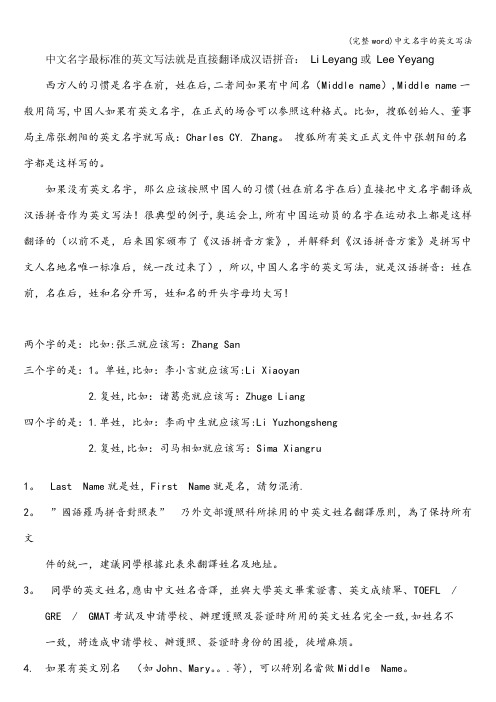
中文名字最标准的英文写法就是直接翻译成汉语拼音:Li Leyang或Lee Yeyang西方人的习惯是名字在前,姓在后,二者间如果有中间名(Middle name),Middle name一般用简写,中国人如果有英文名字,在正式的场合可以参照这种格式。
比如,搜狐创始人、董事局主席张朝阳的英文名字就写成:Charles CY. Zhang。
搜狐所有英文正式文件中张朝阳的名字都是这样写的。
如果没有英文名字,那么应该按照中国人的习惯(姓在前名字在后)直接把中文名字翻译成汉语拼音作为英文写法!很典型的例子,奥运会上,所有中国运动员的名字在运动衣上都是这样翻译的(以前不是,后来国家颁布了《汉语拼音方案》,并解释到《汉语拼音方案》是拼写中文人名地名唯一标准后,统一改过来了),所以,中国人名字的英文写法,就是汉语拼音:姓在前,名在后,姓和名分开写,姓和名的开头字母均大写!两个字的是:比如:张三就应该写:Zhang San三个字的是:1。
单姓,比如:李小言就应该写:Li Xiaoyan2.复姓,比如:诸葛亮就应该写:Zhuge Liang四个字的是:1.单姓,比如:李雨中生就应该写:Li Yuzhongsheng2.复姓,比如:司马相如就应该写:Sima Xiangru1。
Last Name就是姓,First Name就是名,請勿混淆.2。
”國語羅馬拼音對照表”乃外交部護照科所採用的中英文姓名翻譯原則,為了保持所有文件的統一,建議同學根據此表來翻譯姓名及地址。
3。
同學的英文姓名,應由中文姓名音譯,並與大學英文畢業證書、英文成績單、TOEFL / GRE / GMAT考試及申請學校、辦理護照及簽證時所用的英文姓名完全一致,如姓名不一致,將造成申請學校、辦護照、簽證時身份的困擾,徒增麻煩。
4. 如果有英文別名(如John、Mary。
.等),可以將別名當做Middle Name。
[例]王甫平有一個英文別名STEVE,其英文姓名可以下列方式列出:WANG FUPING SLast Name First Name M。
高中英语作文-中国人的名字 Chinese Names
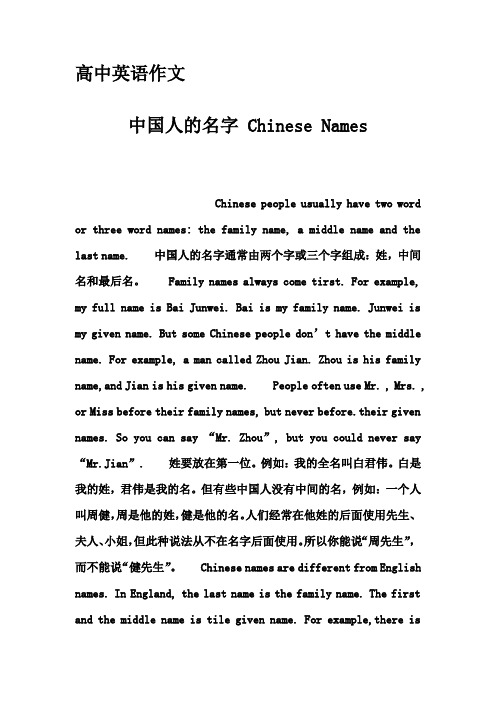
高中英语作文中国人的名字 Chinese NamesChinese people usually have two word or three word names: the family name, a middle name and the last name. 中国人的名字通常由两个字或三个字组成:姓,中间名和最后名。
Family names always come tirst. For example, my full name is Bai Junwei. Bai is my family name. Junwei is my given name. But some Chinese people don’t have the middle name. For example, a man called Zhou Jian. Zhou is his family name,and Jian is his given name. People often use Mr. , Mrs. , or Miss before their family names, but never before.their given names. So you can say “Mr. Zhou”, but you could never say “Mr.Jian”. 姓要放在第一位。
例如:我的全名叫白君伟。
白是我的姓,君伟是我的名。
但有些中国人没有中间的名,例如:一个人叫周健,周是他的姓,健是他的名。
人们经常在他姓的后面使用先生、夫人、小姐,但此种说法从不在名字后面使用。
所以你能说“周先生”,而不能说“健先生”。
Chinese names are different from English names. In England, the last name is the family name. The first and the middle name is tile given name. For example,there isa man called Jim Henry Brown. Brown is his family name. Jim Henry is his given name. Another difference between~ E.nglish and Chinese names is that in China, the younger people’s names shouldn’t be the same as the elder’s in the family.For example, my grandpa’s name is Guo Dong, so i can’t be called Guo Dong again.This shows that we respect the old people. 中国人的名字与英国人的名字不同。
中文名字的英语写法
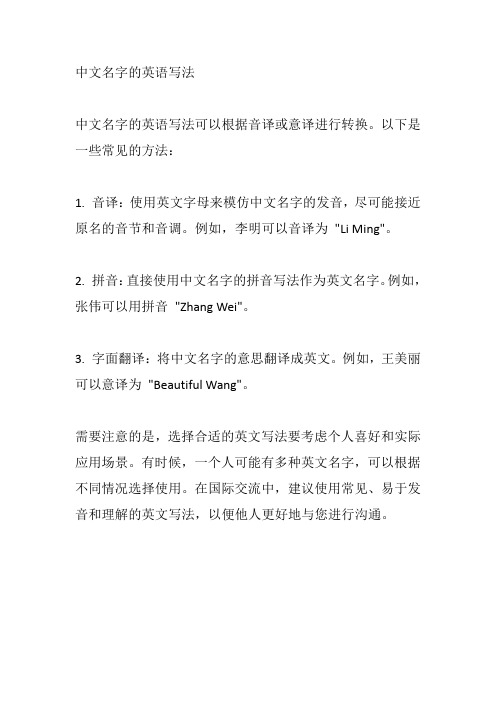
中文名字的英语写法
中文名字的英语写法可以根据音译或意译进行转换。
以下是一些常见的方法:
1. 音译:使用英文字母来模仿中文名字的发音,尽可能接近原名的音节和音调。
例如,李明可以音译为"Li Ming"。
2. 拼音:直接使用中文名字的拼音写法作为英文名字。
例如,张伟可以用拼音"Zhang Wei"。
3. 字面翻译:将中文名字的意思翻译成英文。
例如,王美丽可以意译为"Beautiful Wang"。
需要注意的是,选择合适的英文写法要考虑个人喜好和实际应用场景。
有时候,一个人可能有多种英文名字,可以根据不同情况选择使用。
在国际交流中,建议使用常见、易于发音和理解的英文写法,以便他人更好地与您进行沟通。
中国人英文名字书写格式
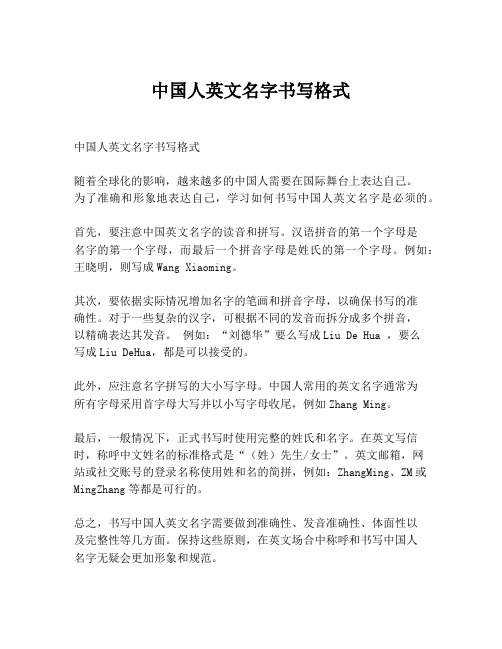
中国人英文名字书写格式
中国人英文名字书写格式
随着全球化的影响,越来越多的中国人需要在国际舞台上表达自己。
为了准确和形象地表达自己,学习如何书写中国人英文名字是必须的。
首先,要注意中国英文名字的读音和拼写。
汉语拼音的第一个字母是
名字的第一个字母,而最后一个拼音字母是姓氏的第一个字母。
例如:王晓明,则写成Wang Xiaoming。
其次,要依据实际情况增加名字的笔画和拼音字母,以确保书写的准
确性。
对于一些复杂的汉字,可根据不同的发音而拆分成多个拼音,
以精确表达其发音。
例如:“刘德华”要么写成Liu De Hua ,要么
写成Liu DeHua,都是可以接受的。
此外,应注意名字拼写的大小写字母。
中国人常用的英文名字通常为
所有字母采用首字母大写并以小写字母收尾,例如Zhang Ming。
最后,一般情况下,正式书写时使用完整的姓氏和名字。
在英文写信时,称呼中文姓名的标准格式是“(姓)先生/女士”。
英文邮箱,网
站或社交账号的登录名称使用姓和名的简拼,例如:ZhangMing、ZM或MingZhang等都是可行的。
总之,书写中国人英文名字需要做到准确性、发音准确性、体面性以
及完整性等几方面。
保持这些原则,在英文场合中称呼和书写中国人
名字无疑会更加形象和规范。
中国人的英文名字在英语作文写作中
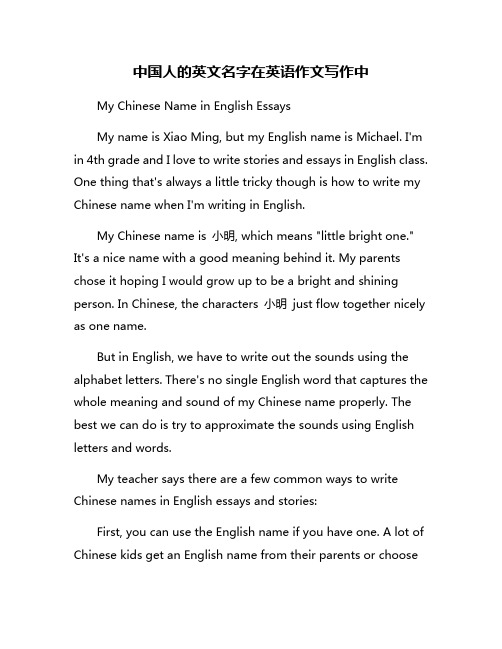
中国人的英文名字在英语作文写作中My Chinese Name in English EssaysMy name is Xiao Ming, but my English name is Michael. I'm in 4th grade and I love to write stories and essays in English class. One thing that's always a little tricky though is how to write my Chinese name when I'm writing in English.My Chinese name is 小明, which means "little bright one." It's a nice name with a good meaning behind it. My parents chose it hoping I would grow up to be a bright and shining person. In Chinese, the characters 小明just flow together nicely as one name.But in English, we have to write out the sounds using the alphabet letters. There's no single English word that captures the whole meaning and sound of my Chinese name properly. The best we can do is try to approximate the sounds using English letters and words.My teacher says there are a few common ways to write Chinese names in English essays and stories:First, you can use the English name if you have one. A lot of Chinese kids get an English name from their parents or chooseone themselves when they start learning English. So I could just write "Michael" when referring to myself in an English essay.The good thing about using an English name is that it flows nicely and doesn't stick out too much in an English paragraph. The bad thing is that it doesn't really connect to my true Chinese identity and cultural roots.Another option is to write out the sound of the Chinese name using English letters. For my name 小明, it could be written as "Xiao Ming." This helps capture more of the real Chinese pronunciation.But even though it's better than just an English name, using English letters still doesn't fully capture the true sounds and tones of my Chinese name. And it can look a bit odd and out of place when everything else in the essay is English words.The third common option is to write the Chinese characters themselves first, followed by the English pronunciation in brackets or parentheses. So for me it would be: 小明(Xiao Ming).I really like this option because it clearly shows both my actual Chinese name characters as well as giving the Englishreaders a way to pronounce it. It connects me to my cultural identity while still being understandable to everyone.The only downside is that it can disrupting the flow of the English a little when reading. But I don't mind that too much. I think it's a small price to pay to properly represent my name!Whichever way we choose to write our Chinese names in English, I'm just glad we have options. Names are an important part of our identity. As Chinese kids growing up studying lots of English, it's nice to have accepted ways to organically integrate our Chinese names and heritage into our English writing.My Chinese name reminds me of my cultural roots, family traditions, and the meaning my parents gave me even before I was born. Whenever I write 小明or "Xiao Ming" in an English essay, it makes me feel proudly connected to my Chinese identity.At the same time, I'm lucky to also have Michael as an English name. It allows me to interact smoothly with English speakers and writers without my name sticking out too much. Someday when I'm older, I may decide to just use Xiao Ming in my writing. But for now, having both names gives me the flexibility to blend into both cultures.Having options for how to write our Chinese names in English is just one of the fun challenges us bilingual kids get to experience! I'm sure me and my Chinese friends will keep exploring the best ways to integrate our cultures as we grow up andgraduate to more advanced writing. But no matter what, our Chinese names will always be a cherished part of our identity.。
英语中中国人名字写法
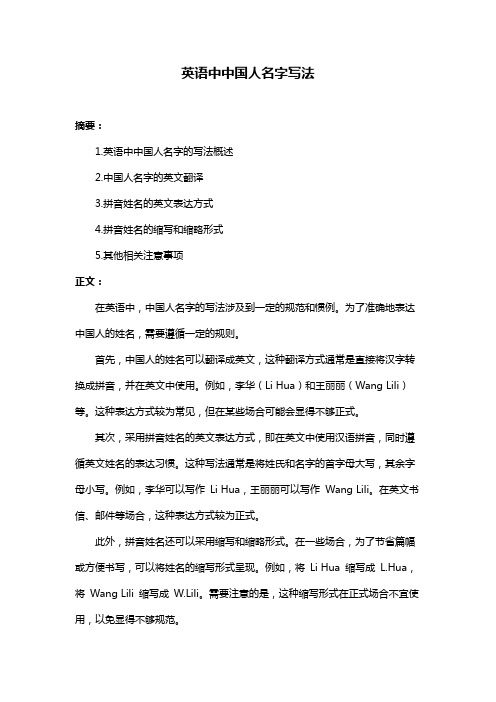
英语中中国人名字写法
摘要:
1.英语中中国人名字的写法概述
2.中国人名字的英文翻译
3.拼音姓名的英文表达方式
4.拼音姓名的缩写和缩略形式
5.其他相关注意事项
正文:
在英语中,中国人名字的写法涉及到一定的规范和惯例。
为了准确地表达中国人的姓名,需要遵循一定的规则。
首先,中国人的姓名可以翻译成英文,这种翻译方式通常是直接将汉字转换成拼音,并在英文中使用。
例如,李华(Li Hua)和王丽丽(Wang Lili)等。
这种表达方式较为常见,但在某些场合可能会显得不够正式。
其次,采用拼音姓名的英文表达方式,即在英文中使用汉语拼音,同时遵循英文姓名的表达习惯。
这种写法通常是将姓氏和名字的首字母大写,其余字母小写。
例如,李华可以写作Li Hua,王丽丽可以写作Wang Lili。
在英文书信、邮件等场合,这种表达方式较为正式。
此外,拼音姓名还可以采用缩写和缩略形式。
在一些场合,为了节省篇幅或方便书写,可以将姓名的缩写形式呈现。
例如,将Li Hua 缩写成L.Hua,将Wang Lili 缩写成W.Lili。
需要注意的是,这种缩写形式在正式场合不宜使用,以免显得不够规范。
最后,在书写中国人名字时,还有一些其他相关注意事项。
例如,在英文中没有姓氏和名字的分界,因此需要遵循英文姓名的书写规范,避免造成误解。
同时,在翻译拼音姓名时,要尽量保持准确,避免出现拼写错误。
总之,在英语中书写中国人名字时,需要遵循一定的规范和惯例。
在英语作文中中国人的名字的
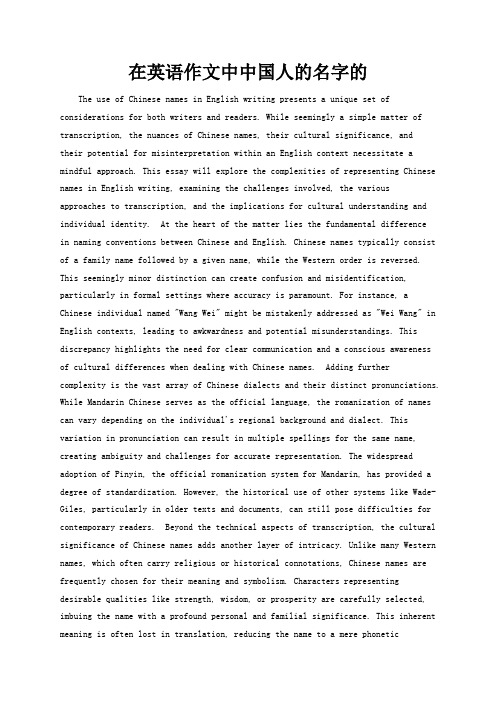
在英语作文中中国人的名字的The use of Chinese names in English writing presents a unique set of considerations for both writers and readers. While seemingly a simple matter of transcription, the nuances of Chinese names, their cultural significance, andtheir potential for misinterpretation within an English context necessitate a mindful approach. This essay will explore the complexities of representing Chinese names in English writing, examining the challenges involved, the various approaches to transcription, and the implications for cultural understanding and individual identity. At the heart of the matter lies the fundamental differencein naming conventions between Chinese and English. Chinese names typically consist of a family name followed by a given name, while the Western order is reversed. This seemingly minor distinction can create confusion and misidentification, particularly in formal settings where accuracy is paramount. For instance, a Chinese individual named "Wang Wei" might be mistakenly addressed as "Wei Wang" in English contexts, leading to awkwardness and potential misunderstandings. This discrepancy highlights the need for clear communication and a conscious awareness of cultural differences when dealing with Chinese names. Adding furthercomplexity is the vast array of Chinese dialects and their distinct pronunciations. While Mandarin Chinese serves as the official language, the romanization of names can vary depending on the individual's regional background and dialect. This variation in pronunciation can result in multiple spellings for the same name, creating ambiguity and challenges for accurate representation. The widespread adoption of Pinyin, the official romanization system for Mandarin, has provided a degree of standardization. However, the historical use of other systems like Wade-Giles, particularly in older texts and documents, can still pose difficulties for contemporary readers. Beyond the technical aspects of transcription, the cultural significance of Chinese names adds another layer of intricacy. Unlike many Western names, which often carry religious or historical connotations, Chinese names are frequently chosen for their meaning and symbolism. Characters representing desirable qualities like strength, wisdom, or prosperity are carefully selected, imbuing the name with a profound personal and familial significance. This inherent meaning is often lost in translation, reducing the name to a mere phoneticrepresentation devoid of its cultural richness. The challenge for writers, then,is to find a balance between accuracy and accessibility. While adhering to standardized romanization systems like Pinyin ensures consistency and facilitates identification, it can also strip the name of its cultural context and personal resonance. Writers must navigate this delicate balance, considering the purpose of their writing and the intended audience. In academic or formal settings,prioritizing accuracy and consistency is crucial. However, in creative writing or personal narratives, a more nuanced approach that incorporates the name's meaning and cultural significance may be appropriate. Moreover, the use of Chinese namesin English writing has implications for cultural understanding and individual identity. In an increasingly globalized world, accurate representation and respectful treatment of names from diverse cultures are paramount. Mispronouncing or misspelling a name can be perceived as disrespectful or even offensive, undermining efforts at intercultural communication and understanding. Furthermore, for individuals bearing these names, the way their names are represented inEnglish can significantly impact their sense of identity and belonging. Feeling acknowledged and understood in their entirety, including the cultural significance of their names, is crucial for individuals navigating cross-cultural interactions. In conclusion, the use of Chinese names in English writing presents a multifaceted challenge that extends beyond mere transcription. Recognizing the inherent differences in naming conventions, navigating the complexities of romanization,and acknowledging the cultural significance embedded within these names arecrucial steps towards respectful and accurate representation. By approaching this issue with sensitivity and awareness, writers can contribute to a more inclusive and culturally aware environment, fostering better understanding and communication between different cultural groups.。
- 1、下载文档前请自行甄别文档内容的完整性,平台不提供额外的编辑、内容补充、找答案等附加服务。
- 2、"仅部分预览"的文档,不可在线预览部分如存在完整性等问题,可反馈申请退款(可完整预览的文档不适用该条件!)。
- 3、如文档侵犯您的权益,请联系客服反馈,我们会尽快为您处理(人工客服工作时间:9:00-18:30)。
2)如果是单姓,名是一个字,姓的第 一个字母要大写,名的第一个字母也要 大写,其他字母都小写。 例:Tao Zhe陶喆 3)如果是复姓,要把复姓拼写在一 起,只需大写复姓的第一个字母。名的 拼写方式如上所说。 例:Dongfang Bubai东方不败
4)如果名字里有可能造成歧义 的拼写时,中间要用间隔符号 “ ’ ”隔开。 例:Zhang Xi’an张希安
在英语中如何拼写中国人的姓出中国人 的姓名,姓和名一定要分开写。姓在前, 名在后。 1)如果是单姓,名是两个字,姓的第 一个字母要大写,名的第一个字母也要 大写,其余字母都小写,且表示名的两 个字的拼音要合在一起,不得分开。 例:Sun Yanzi孙燕姿
谢谢!
